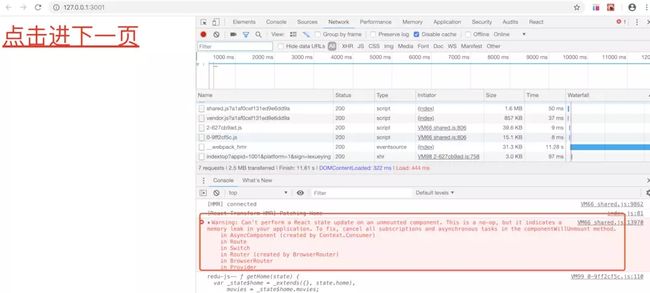- 在Ubuntu中编译含有JSON的文件出现报错
芝麻糊76
Linuxkill_buglinuxubuntujson
在ubuntu中进行JSON相关学习的时候,我发现了一些小问题,决定与大家进行分享,减少踩坑时候出现不必要的时间耗费截取部分含有JSON部分的代码进行展示char*str="{\"title\":\"JSONExample\",\"author\":{\"name\":\"JohnDoe\",\"age\":35,\"isVerified\":true},\"tags\":[\"json\",\"
- 系列3:【深入】qiankun动态与按需加载子应用—像电影一样控制出现时机
rabbit_it
qiankun学习前端框架前端阿里云
一、引言:为何需要动态加载在现代前端开发中,性能优化始终是一个关键问题。对于微前端架构而言,管理多个子应用带来了前所未有的灵活性,但也对资源的加载和使用效率提出了更高要求。假设你的微前端项目就像一场电影,而子应用是场景或演员。在不同的情节中,我们只需要特定的场景和演员出现,而不需要所有场景和演员一开始就站在舞台上等待。这时,动态加载和按需加载就成为了关键工具——让需要的内容在正确的时机上场,节省性
- 注册中心 Nacos 异常实例需要30s才能剔除 Nacos心跳时间设置(踩坑)
2401_84046645
程序员java开发语言
instance.setPort(9999);Mapmetadata=newHashMap();//设置心跳的周期,单位为秒,这里将心跳间隔设置为3秒:metadata.put(PreservedMetadataKeys.HEART_BEAT_INTERVAL,“3000”);//设置心跳超时时间,单位为秒,这里将心跳超时时间设为6秒,//即服务端6秒收不到客户端心跳,会将该客户端注册的实例设为不
- 【Webpack 踩坑】CSS加载缓慢
①条咸鱼
webpackcssrust
问题:使用webpack5,单独index.scss在assets/css目录下,但是不管是production还是development环境下,都会出现dom加载完后再渲染样式本意是想要将样式单独打包到一个文件夹,还有压缩css于是用了mini-css-extract-plugin这个loader(前提要先安装)//webpack.config.jsconstMiniCssExtractPlug
- vllm在线推理踩坑记
懂点投资的码农
大语言模型ai语言模型python
最近在《AI大模型全栈工程师》课程里看老师推荐使用vllm部署大模型,优点就不详细介绍了,这里摘抄一段来自于Qwen2上手指南对于它的简单介绍:它易于使用,且具有最先进的服务吞吐量、高效的注意力键值内存管理(通过PagedAttention实现)、连续批处理输入请求、优化的CUDA内核等功能。至于原理就先不看了,直接上手部署,以后再来补理论知识。一、vLLM在线推理在Qwen2的上市指南里介绍了v
- Swift基础语法学习
中古传奇
swiftc++面试java
Swift基础语法学习0前言--Swift特点优势(忽悠点)1环境搭建1.1Xcode安装1.2离线安装踩坑指南2Swift语言2.1基本数据类型2.1.1申明常量和变量2.1.2整数类型2.1.3浮点数2.1.4布尔值2.1.5元组2.1.6可选类型2.1.7错误处理3断言和先决条件3.1断言和先决条件调试代码的好处3.2使用断言进行调试3.3强制执行先决条件3.4基本运算符时间:2021-22
- 购买莆田鞋有哪些套路和陷阱?怎样避免踩坑
芒果不芒
购买莆田鞋有哪些套路和陷阱?怎样避免踩坑小白在购买莆田鞋时有很多不懂的问题,而且莆田鞋商家卖的货又良莠不齐,为了避免踩坑今天我就把经验分享给大家,记住最重要的一点就是找到一个比较实在的良心商家购买,因为真正做生意的诚信商家是不会为了一点蝇头小利去坑人的,假如找到一个无良商家,它变着法的想着坑你,你怎样都会被骗的,俗话说得好:不怕贼偷就怕贼惦记!今天我顺便给大家推荐三家专门做高品质的莆田鞋商家也:k
- 每日踩坑之 前后端时间格式转换
孤心人
学习心得
时间格式转换1.在后台进行格式处理今天在做管理员显示用户信息的时候发现,数据库里面保存的Date类取出后的格式是这样的:MonMar0911:36:53CST2020。我们都知道平时显示的时间格式都是2020-03-0911:36:53,而这个显示的是Date类默认格式。原模原样的返回给用户看肯定是不行的。话不多说,上代码:Datedate=newDate();SimpleDateFormatsd
- dubbo整合nacos(狠狠踩坑 之 自己淋过雨不想让别人也一起)
程序员-珍
dubbo微服务springbootjava后端
快速入门1.dubbo官网强烈推荐小伙伴们去官网看看哪里写的都不如官网。我是看了网上的代码,狠狠踩坑,这个东西搞了好久~~~2.消费服务和提供服务都加上依赖org.apache.dubbodubbo3.0.9com.alibaba.nacosnacos-client2.1.03.创建一个DemoService接口和一个DemoServiceImpl实现类,DemoService类上面要加上注解@D
- gitlab的下载和安装教程&我的踩坑经验
o762
gitlab
#######这里就记录一下内网的安装包形式的安装过程############1、下载过程和安装过程1)进入gitlab官网,platform>Install.--gitlab有极狐版,CE(社区版)和EE(企业版)。下面以CE版进行研究和学习。2)也可以进入官网镜像网站或者其它各大镜像网站下载gitlab-ce的rpm包--官网镜像网站:https://packages.gitlab.com/g
- python apscheduler、任务可以是死循环吗_flask_apscheduler 定时任务踩坑记录
weixin_39564605
pythonapscheduler任务可以是死循环吗
背景由于需要再flask做一个定时任务,然后发现了这个库flask_apscheduler.使用很简单,就是可能由于某种情况,会有一些意外,下面是我的使用记录。首先按照官方文档跑一个示例fromflaskimportFlaskfromflask_apschedulerimportAPSchedulerclassConfig(object):JOBS=[{'id':'job1','func':'jo
- SpringCloud-Alibaba之Seata入门以及踩坑
DN金猿
springbootjava数据库seata
前言上一篇文章:➣SpringCloudAlibaba之Seata入门以及踩坑(一)老顾介绍了seata相关的准备工作,以及版本的选择;今天老顾就来介绍一下seata的使用。以及在使用过程中遇到的问题。案例背景今天老顾介绍的案例场景也就是网上常用的场景,用户下单场景。整个流程就是用户下单时:1)创建订单,订单状态为创建中2)扣减商品库存3)扣减用户金额4)更改订单状态,订单状态为已完结从以上业务流
- 避坑指南:ECS 与 RDS 选购的那些“坑”,你踩了几个?
吃面不喝汤66
后端开发服务器运维
在阿里云上部署项目时,ECS和RDS是我们常用的云计算资源。然而,许多人在选购和配置这两者时容易踩坑,比如在VPC、可用区等关键配置上的选择。这篇文章将结合我踩过的坑,分享选购ECS和RDS的最佳实践,帮助大家避免那些隐藏的“地雷”。️场景回顾:当我以为很简单的时候...在项目初期,我根据需求购买了一台ECS实例和一个RDS数据库实例,想着这样能快速搭建出项目环境。结果购买完后才发现,ECS和RD
- 记录word转xml文件踩坑
DebugDiver代码深处潜水员
异常处理wordxml
word文件另存为xml文件后,xml文件乱码解决方法:1.用word打开.docx文件2.另存为xml文件3.点击工具->Web选项->编码,选择UTF-84.点击确定5.使用notpad++打开xml文件6.使用xmltool进行xml格式化即可。
- qt执行终端命令_Qt模拟Linux终端Terminal与系统交互(QProcess)
知乎视频
qt执行终端命令
最近在搞一个数据库备份和恢复的工具,想在自己的程序里显示过程,即将gnome-ternimal的打印信息输出到我的程序里。因为要和ternimal交互,自然就想到用QProcess启用终端然后互相开始对话交互。但其中遇到的一些问题网上查了很久才最后解决,由于网上的答案并不是现成的,需要自己理解后才能有思路解决,所以在这里把我的思路过程分享出来,避免后人再踩坑。认识真实的gnome-ternimal
- uniapp微信小程序开发踩坑日记:Pinia持久化报错Cannot read property ‘localStorage‘ of undefined
肖肖肖丽珠
uni-app微信小程序小程序
插件默认使用localStorage实现持久化,小程序端不兼容,需要替换持久化APIimport{defineStore}from'pinia'exportconstuseCommonStore=defineStore('pack-store',{state:():State=>({wwInfo:{},globalData:{},timerLock:false,//是否关闭合成定时器}),gett
- Window 下 Vim 环境安装踩坑问题汇总及解决方法
yyywxk
#Python模块有关问题vimpythonmambawindows
导航Linux下Mamba及Vim安装问题参看本人之前博客:Mamba环境安装踩坑问题汇总及解决方法Linux下Vmamba安装教程参看本人之前博客:Vmamba安装教程(无需更改base环境中的cuda版本)Windows下VMamba的安装参看本人之前博客:Windows下VMamba安装教程(无需更改base环境中的cuda版本且可加速)Window下Mamba环境教程参看本人之前博客:Wi
- 删除文件踩的坑
天珩
今日所得java
踩坑的点:我删除文件的方式,一开始,为了方便,使用了file.deleteOnExit();这种方式,还顺便判断了一下,只有文件存在是时候才删除,省的多写一步判空操作,但是,闲来无事的时候,做了个测试,因为发现cpu有的时候占用率比较高翻翻源码/***Requeststhatthefileordirectorydenotedbythisabstract*pathnamebedeletedwhent
- Collectors.toMap 报错 NullPointerException
赵丙双
java踩坑CollectorstoMapjavastreamNPE
最近线上偶尔会报一个NPE,是Collectors.toMap导致的,这里小记一下,防止再次踩坑。场景:批量查询用户信息,查询结果为List,然后将其转换成Map,以供其他地方使用,但在Collectors.toMap时抛出了异常NullPointerException。复现问题publicclassToMapTest{publicstaticvoidmain(String[]args){List
- Node.js的模块
云夕々
node.js模块前端node.js前端
1.模块的概念模块:指解决一个复杂问题的时候,自顶向下逐层把系统划分成若干模块的过程。对于整个系统来讲,模块是可以组合、分解和更换的单元。在编辑领域中的模块,就是遵守固定的规则,把一个大文件拆成独立并且相互依赖的多个小模块。代码进行模块拆分的好处有:提高代码的复用性,提高代码的可维护性,可以实现按需加载。2.Node.js中的模块Node.js中模块的分类Node.js中根据模块来源的不同,把模块
- uniapp安装自动导入插件
小汤猿人类
vue.jsjavascriptecmascript
在日常编写中发现不断的使用import太麻烦,每次使用组件都需要导入,应该如何解决呢可以通过unplugin-auto-import插件来完成主要功能自动导入Vue组件:例如ref,reactive,computed等。支持其他库:可以配置来支持如lodash,dayjs等常用库的自动导入。按需加载:只导入实际使用的部分,减少打包体积。如何使用??以管理员运行HbuilderX打开终端运行以下命令
- 回顾vue开发spa(踩坑记录)
Just do it
使用vueJS开发前端页面差不多也有大半多年了。由于项目后台管理页面最早都是使用JQ进行开发的,刚开始使用vue的时候,只能是直接在页面里面引入vueJS框架进行开发,期间把项目后台的编辑页面和其他复杂页面全部改用vueJS的了(没有用到组件,只是增强了一下交互,开发更简单便捷)。由于工期和个人习惯问题,期间也留下了很多坑和隐患,比如不少页面是JQ和vue混用,导致后来改功能的时候痛不欲生……所以
- C语言 int uint16_t 踩坑记录
woainizhongguo.
常见问题/疑难杂症C/C++c语言开发语言
使用uint16_t存储int的负数,有可能读出来是65535?是的,如果你尝试使用uint16_t类型来存储一个负数int值,你可能会得到65535。这是因为uint16_t是一个无符号的16位整数类型,它的取值范围是从0到65535(即0到2^16-1)。当将一个负数强制转换为uint16_t时,实际上会发生一种称为“类型提升”的过程,这个过程会将负数的二进制表示转换为一个无符号整数。这里有一
- JVM--双亲委派机制
杨Alan
编程语言jvm
概述 Java虚拟机对class文件采用的是按需加载的方式,也就是说当需要使用该类时才会将她的class文件加载到内存生成的class对象。而且加载某个类的class文件时,java虚拟机采用的是双亲委派模式,即把请求交由父类处理,它是一种任务委派模式。双亲委派机制的工作原理 •(1)如果一个类加载器收到了类加载请求,它并不会自己先去加载,而是把这个请求委托给父类的加载器去执行;
- Java——踩坑Arrays.asList()
你知道烟火吗
javajava开发语言
坑1:不能直接使用Arrsys.asList()来转换基本类型数据publicstaticvoidtest1(){//1、不能直接使用asList来转换基本类型数组int[]arr={1,2,3};Listlist=Arrays.asList(arr);System.out.printf("list:%ssize:%sclass:%s",list,list.size(),list.get(0).g
- 2018-08-01
小汐daisy
快速入门indesgin故事的开始是这样的:某天工作日下午老大问:福爽你会不会用indesgin?我:我听说过就是排版图书的那个软件吧?老大:是的,这个软件排书很简单,而且很快。市场部最近要排一个书,据说很大,一百多页。今天下午你看一下,明天他们的文档就发过来了,而且比较着急,你周末有事儿吗?我:没什么事儿,好的,我现在熟悉一下软件。故事就这样开始了,这是一个充满悲伤的故事。我是一个纯小白,踩坑无
- visual studio编写jni踩坑
吉凶以情迁
这个东西说简单也简单,但是一不小心就如坑,以至于导致我多次踩坑都没成功,今天总算成功了!1、新建项目要使用空项目,否则有搞不完的坑等着你。2、添加java环境目录下的lib和lib\x86目录到工程的属性->配置属性->VC++目录->包含目录。3、配置属性生成格式为dll,而不是exe,4、配置输出的为x64而不是x86(你修改你会发现又要重新配置)5、头文件不用拖拽进去而是先放到项目目录然后添
- 遇见自己
百分百拒绝吗
南怀瑾先生说:“真正的修行不是为了遇到佛,而是为了遇见自己。”我们生在这个最好的时代,与天才和半神同行。我们生而平凡,各自有光。我们以梦为马,不负韶华。此生,活出性情,活出自我,活出精彩,就很足够了。今天的我,因为工作的事情,生了一场无谓的气;职场就是这样,有人不计利益想尽量把工作做好,有人却失岗、失职,造成无法弥补的损失。一个人失岗,这条战线上所有人去填坑,前仆后继,然后呢?坑依然是坑。这个就叫
- Python人工智能学习路线_python ai学习
性能优化Java开发
python人工智能学习
反问一个玩笑,程序员怎么会没有方法呢?随手就定义一个Python方法(funtion)。。。deffuntion():return'haha,往下看,下面会介绍方法'回到笔者,一名普普通通的程序员,当初也是”误打误撞“学习Python入门到机器学习、深度学习,至今有4个年头,踩了很多坑,下文说到的学习方法、具体化的学习路线也就填坑试错的经验罢了。一、学习方法是?说到学习方法,其实我们谈到的人工智能
- Redis使用——Redis的redis.conf配置注释详解(三)
武昌库里写JAVA
面试题汇总与解析springlog4jjava开发语言算法
Redis使用——Redis的redis.conf配置注释详解(三)背景日常我们开发时,我们会遇到各种各样的奇奇怪怪的问题(踩坑o(╯□╰)o),这个常见问题系列就是我日常遇到的一些问题的记录文章系列,这里整理汇总后分享给大家,让其还在深坑中的小伙伴有绳索能爬出来。同时在这里也欢迎大家把自己遇到的问题留言或私信给我,我看看其能否给大家解决。开发环境系统:Ubuntu工具:Docker镜像:Redi
- jQuery 键盘事件keydown ,keypress ,keyup介绍
107x
jsjquerykeydownkeypresskeyup
本文章总结了下些关于jQuery 键盘事件keydown ,keypress ,keyup介绍,有需要了解的朋友可参考。
一、首先需要知道的是: 1、keydown() keydown事件会在键盘按下时触发. 2、keyup() 代码如下 复制代码
$('input').keyup(funciton(){
- AngularJS中的Promise
bijian1013
JavaScriptAngularJSPromise
一.Promise
Promise是一个接口,它用来处理的对象具有这样的特点:在未来某一时刻(主要是异步调用)会从服务端返回或者被填充属性。其核心是,promise是一个带有then()函数的对象。
为了展示它的优点,下面来看一个例子,其中需要获取用户当前的配置文件:
var cu
- c++ 用数组实现栈类
CrazyMizzz
数据结构C++
#include<iostream>
#include<cassert>
using namespace std;
template<class T, int SIZE = 50>
class Stack{
private:
T list[SIZE];//数组存放栈的元素
int top;//栈顶位置
public:
Stack(
- java和c语言的雷同
麦田的设计者
java递归scaner
软件启动时的初始化代码,加载用户信息2015年5月27号
从头学java二
1、语言的三种基本结构:顺序、选择、循环。废话不多说,需要指出一下几点:
a、return语句的功能除了作为函数返回值以外,还起到结束本函数的功能,return后的语句
不会再继续执行。
b、for循环相比于whi
- LINUX环境并发服务器的三种实现模型
被触发
linux
服务器设计技术有很多,按使用的协议来分有TCP服务器和UDP服务器。按处理方式来分有循环服务器和并发服务器。
1 循环服务器与并发服务器模型
在网络程序里面,一般来说都是许多客户对应一个服务器,为了处理客户的请求,对服务端的程序就提出了特殊的要求。
目前最常用的服务器模型有:
·循环服务器:服务器在同一时刻只能响应一个客户端的请求
·并发服务器:服
- Oracle数据库查询指令
肆无忌惮_
oracle数据库
20140920
单表查询
-- 查询************************************************************************************************************
-- 使用scott用户登录
-- 查看emp表
desc emp
- ext右下角浮动窗口
知了ing
JavaScriptext
第一种
<!DOCTYPE html PUBLIC "-//W3C//DTD XHTML 1.0 Transitional//EN" "http://www.w3.org/TR/xhtml1/DTD/xhtml1-transitional.dtd">
<html xmlns="http://www.w3.org/1999/
- 浅谈REDIS数据库的键值设计
矮蛋蛋
redis
http://www.cnblogs.com/aidandan/
原文地址:http://www.hoterran.info/redis_kv_design
丰富的数据结构使得redis的设计非常的有趣。不像关系型数据库那样,DEV和DBA需要深度沟通,review每行sql语句,也不像memcached那样,不需要DBA的参与。redis的DBA需要熟悉数据结构,并能了解使用场景。
- maven编译可执行jar包
alleni123
maven
http://stackoverflow.com/questions/574594/how-can-i-create-an-executable-jar-with-dependencies-using-maven
<build>
<plugins>
<plugin>
<artifactId>maven-asse
- 人力资源在现代企业中的作用
百合不是茶
HR 企业管理
//人力资源在在企业中的作用人力资源为什么会存在,人力资源究竟是干什么的 人力资源管理是对管理模式一次大的创新,人力资源兴起的原因有以下点: 工业时代的国际化竞争,现代市场的风险管控等等。所以人力资源 在现代经济竞争中的优势明显的存在,人力资源在集团类公司中存在着 明显的优势(鸿海集团),有一次笔者亲自去体验过红海集团的招聘,只 知道人力资源是管理企业招聘的 当时我被招聘上了,当时给我们培训 的人
- Linux自启动设置详解
bijian1013
linux
linux有自己一套完整的启动体系,抓住了linux启动的脉络,linux的启动过程将不再神秘。
阅读之前建议先看一下附图。
本文中假设inittab中设置的init tree为:
/etc/rc.d/rc0.d
/etc/rc.d/rc1.d
/etc/rc.d/rc2.d
/etc/rc.d/rc3.d
/etc/rc.d/rc4.d
/etc/rc.d/rc5.d
/etc
- Spring Aop Schema实现
bijian1013
javaspringAOP
本例使用的是Spring2.5
1.Aop配置文件spring-aop.xml
<?xml version="1.0" encoding="UTF-8"?>
<beans
xmlns="http://www.springframework.org/schema/beans"
xmln
- 【Gson七】Gson预定义类型适配器
bit1129
gson
Gson提供了丰富的预定义类型适配器,在对象和JSON串之间进行序列化和反序列化时,指定对象和字符串之间的转换方式,
DateTypeAdapter
public final class DateTypeAdapter extends TypeAdapter<Date> {
public static final TypeAdapterFacto
- 【Spark八十八】Spark Streaming累加器操作(updateStateByKey)
bit1129
update
在实时计算的实际应用中,有时除了需要关心一个时间间隔内的数据,有时还可能会对整个实时计算的所有时间间隔内产生的相关数据进行统计。
比如: 对Nginx的access.log实时监控请求404时,有时除了需要统计某个时间间隔内出现的次数,有时还需要统计一整天出现了多少次404,也就是说404监控横跨多个时间间隔。
Spark Streaming的解决方案是累加器,工作原理是,定义
- linux系统下通过shell脚本快速找到哪个进程在写文件
ronin47
一个文件正在被进程写 我想查看这个进程 文件一直在增大 找不到谁在写 使用lsof也没找到
这个问题挺有普遍性的,解决方法应该很多,这里我给大家提个比较直观的方法。
linux下每个文件都会在某个块设备上存放,当然也都有相应的inode, 那么透过vfs.write我们就可以知道谁在不停的写入特定的设备上的inode。
幸运的是systemtap的安装包里带了inodewatch.stp,位
- java-两种方法求第一个最长的可重复子串
bylijinnan
java算法
import java.util.Arrays;
import java.util.Collections;
import java.util.List;
public class MaxPrefix {
public static void main(String[] args) {
String str="abbdabcdabcx";
- Netty源码学习-ServerBootstrap启动及事件处理过程
bylijinnan
javanetty
Netty是采用了Reactor模式的多线程版本,建议先看下面这篇文章了解一下Reactor模式:
http://bylijinnan.iteye.com/blog/1992325
Netty的启动及事件处理的流程,基本上是按照上面这篇文章来走的
文章里面提到的操作,每一步都能在Netty里面找到对应的代码
其中Reactor里面的Acceptor就对应Netty的ServerBo
- servelt filter listener 的生命周期
cngolon
filterlistenerservelt生命周期
1. servlet 当第一次请求一个servlet资源时,servlet容器创建这个servlet实例,并调用他的 init(ServletConfig config)做一些初始化的工作,然后调用它的service方法处理请求。当第二次请求这个servlet资源时,servlet容器就不在创建实例,而是直接调用它的service方法处理请求,也就是说
- jmpopups获取input元素值
ctrain
JavaScript
jmpopups 获取弹出层form表单
首先,我有一个div,里面包含了一个表单,默认是隐藏的,使用jmpopups时,会弹出这个隐藏的div,其实jmpopups是将我们的代码生成一份拷贝。
当我直接获取这个form表单中的文本框时,使用方法:$('#form input[name=test1]').val();这样是获取不到的。
我们必须到jmpopups生成的代码中去查找这个值,$(
- vi查找替换命令详解
daizj
linux正则表达式替换查找vim
一、查找
查找命令
/pattern<Enter> :向下查找pattern匹配字符串
?pattern<Enter>:向上查找pattern匹配字符串
使用了查找命令之后,使用如下两个键快速查找:
n:按照同一方向继续查找
N:按照反方向查找
字符串匹配
pattern是需要匹配的字符串,例如:
1: /abc<En
- 对网站中的js,css文件进行打包
dcj3sjt126com
PHP打包
一,为什么要用smarty进行打包
apache中也有给js,css这样的静态文件进行打包压缩的模块,但是本文所说的不是以这种方式进行的打包,而是和smarty结合的方式来把网站中的js,css文件进行打包。
为什么要进行打包呢,主要目的是为了合理的管理自己的代码 。现在有好多网站,你查看一下网站的源码的话,你会发现网站的头部有大量的JS文件和CSS文件,网站的尾部也有可能有大量的J
- php Yii: 出现undefined offset 或者 undefined index解决方案
dcj3sjt126com
undefined
在开发Yii 时,在程序中定义了如下方式:
if($this->menuoption[2] === 'test'),那么在运行程序时会报:undefined offset:2,这样的错误主要是由于php.ini 里的错误等级太高了,在windows下错误等级
- linux 文件格式(1) sed工具
eksliang
linuxlinux sed工具sed工具linux sed详解
转载请出自出处:
http://eksliang.iteye.com/blog/2106082
简介
sed 是一种在线编辑器,它一次处理一行内容。处理时,把当前处理的行存储在临时缓冲区中,称为“模式空间”(pattern space),接着用sed命令处理缓冲区中的内容,处理完成后,把缓冲区的内容送往屏幕。接着处理下一行,这样不断重复,直到文件末尾
- Android应用程序获取系统权限
gqdy365
android
引用
如何使Android应用程序获取系统权限
第一个方法简单点,不过需要在Android系统源码的环境下用make来编译:
1. 在应用程序的AndroidManifest.xml中的manifest节点
- HoverTree开发日志之验证码
hvt
.netC#asp.nethovertreewebform
HoverTree是一个ASP.NET的开源CMS,目前包含文章系统,图库和留言板功能。代码完全开放,文章内容页生成了静态的HTM页面,留言板提供留言审核功能,文章可以发布HTML源代码,图片上传同时生成高品质缩略图。推出之后得到许多网友的支持,再此表示感谢!留言板不断收到许多有益留言,但同时也有不少广告,因此决定在提交留言页面增加验证码功能。ASP.NET验证码在网上找,如果不是很多,就是特别多
- JSON API:用 JSON 构建 API 的标准指南中文版
justjavac
json
译文地址:https://github.com/justjavac/json-api-zh_CN
如果你和你的团队曾经争论过使用什么方式构建合理 JSON 响应格式, 那么 JSON API 就是你的 anti-bikeshedding 武器。
通过遵循共同的约定,可以提高开发效率,利用更普遍的工具,可以是你更加专注于开发重点:你的程序。
基于 JSON API 的客户端还能够充分利用缓存,
- 数据结构随记_2
lx.asymmetric
数据结构笔记
第三章 栈与队列
一.简答题
1. 在一个循环队列中,队首指针指向队首元素的 前一个 位置。
2.在具有n个单元的循环队列中,队满时共有 n-1 个元素。
3. 向栈中压入元素的操作是先 移动栈顶指针&n
- Linux下的监控工具dstat
网络接口
linux
1) 工具说明dstat是一个用来替换 vmstat,iostat netstat,nfsstat和ifstat这些命令的工具, 是一个全能系统信息统计工具. 与sysstat相比, dstat拥有一个彩色的界面, 在手动观察性能状况时, 数据比较显眼容易观察; 而且dstat支持即时刷新, 譬如输入dstat 3, 即每三秒收集一次, 但最新的数据都会每秒刷新显示. 和sysstat相同的是,
- C 语言初级入门--二维数组和指针
1140566087
二维数组c/c++指针
/*
二维数组的定义和二维数组元素的引用
二维数组的定义:
当数组中的每个元素带有两个下标时,称这样的数组为二维数组;
(逻辑上把数组看成一个具有行和列的表格或一个矩阵);
语法:
类型名 数组名[常量表达式1][常量表达式2]
二维数组的引用:
引用二维数组元素时必须带有两个下标,引用形式如下:
例如:
int a[3][4]; 引用:
- 10点睛Spring4.1-Application Event
wiselyman
application
10.1 Application Event
Spring使用Application Event给bean之间的消息通讯提供了手段
应按照如下部分实现bean之间的消息通讯
继承ApplicationEvent类实现自己的事件
实现继承ApplicationListener接口实现监听事件
使用ApplicationContext发布消息
